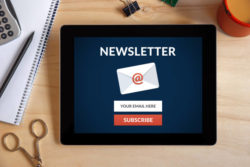How to run a successful email marketing campaign
“If social media is a cocktail party, then email marketing is the ‘meet up for coffee.’ The original 1 to 1 channel.” – Erik Harbison If you’re in the process of building...
Filter by Category

“If social media is a cocktail party, then email marketing is the ‘meet up for coffee.’ The original 1 to 1 channel.” – Erik Harbison If you’re in the process of building...
Posted by Sam Lauron

As the internet continues to exponentially grow, so does its capacity to earn businesses money. One big reason for this is digital marketing. However, as is the case with much of...
Posted by Weslie Oeftering

Yes! Email newsletters can still be effective. Even with all the new ways we can communicate with one another digitally, email newsletters can still be a worthwhile investment...
Posted by Weslie Oeftering

Emails are a great way to connect with your customers and remind them of your business. If you’ve ever run an email marketing campaign, you understand the importance of open and...
Posted by provercoffee

“If social media is a cocktail party, then email marketing is the ‘meet up for coffee.’ The original 1 to 1 channel.” – Erik Harbison
If you’re in the process of building your startup’s marketing strategy, you know the importance of email marketing to get the word out and build relationships with customers.
Falling under the umbrella of digital marketing, email marketing is one of the easiest ways to directly communicate your company’s value with prospective clients and turn leads into customers.
Below are 5 useful tips to create a successful email marketing campaign.
To accomplish your goals in an email marketing campaign, you must first understand what those goals are. It’s nearly impossible to reach your audience if you don’t know why you are trying to reach them.
Do you want to nurture leads? Inform them of upcoming events? Build trust? Recap your events? Build awareness? Promote sales? Whatever your goals are will direct the different forms of strategies used to reach your target audience.
The best way to create attainable goals is to make sure they are SMART, or specific, measurable, attainable, relevant, and time-based. Asking simple questions of who, where, when, and why, will create goals that are measurable and therefore attainable.
Now that you understand what your goal is with your audience, it’s important to know who your audience is. Understanding the demographics, psychographics, and geographics will better enable you to understand what type of email they will be interested in.
Is your audience interested in connecting with your company by understanding the story behind it or are they just interested in the latest sales? Digging deeper into understanding your target market will not only allow you to better reach them but also create more personalized emails, resulting in greater click-through rates and ROI. Without this understanding of the customer, the emails may prove to be a waste of time and resources.
After researching your target market, segmenting this market into smaller groups will help you stay relevant to those you are trying to reach. If you have multiple groups within your target market, this will enable you to reach all of them. The more relevant your email marketing campaign, the better the results you will have.
Timing is important. No one likes receiving emails from a company every day. However, once a year will not cut it either. In order to help customers not tune you out but also stay engaged, nailing timing is crucial. The best way to do this is to create a schedule.
While every startup is different, we recommend sending at least one email a month. Perhaps even consider sending one weekly or bi-weekly to keep engagement without increasing the chance of the customer tuning you out. Whatever your company decides, choosing a schedule for the sending frequency and staying consistent is key for a successful email campaign.
If the subject line doesn’t grab the attention of the reader, they won’t open the email. This does not mean creating clickbait. However, the subject line is the gatekeeper to the rest of the email and therefore the main evaluation of whether or not your emails will be read. It’s important to spend time on this.
According to HubSpot, some of the best ways to use the subject line is by piquing their interest, promising value, using personalization, opening a loop (that will be closed by the end of the email), or using your startup’s unique voice.
The final step in creating a successful email marketing campaign is to initially test and afterward evaluate. By first testing your emails in small groups, you will be able to see what aspects of your email works and what do not. By tweaking small aspects of the email now, you will save yourself time and money in the long run.
After running your email marketing campaign, it’s important to evaluate its success. This will help you understand what went well and what needed improvement. While there are several important email marketing metrics to pay attention to, a few key metrics when you’re just getting started include open rate, click-through rate (CTR), and the number of unsubscribes. These three will indicate whether your emails are getting opened, if the email content is driving traffic, and whether or not you’re targeting the right audience.
About Lara Tanner: Lara is an Intern for Swyft, which is a tech PR firm in Austin and Houston and a top digital marketing and PR agency in Denver since its founding in 2011. Swyft recently opened a satellite office where it offers tech PR in San Francisco. Swyft was also listed as one of the top tech PR agencies in Texas by the B2B services review site, Clutch.co.

Emails are a great way to connect with your customers and remind them of your business. If you’ve ever run an email marketing campaign, you understand the importance of open and...

Yes! Email newsletters can still be effective. Even with all the new ways we can communicate with one another digitally, email newsletters can still be a worthwhile investment...